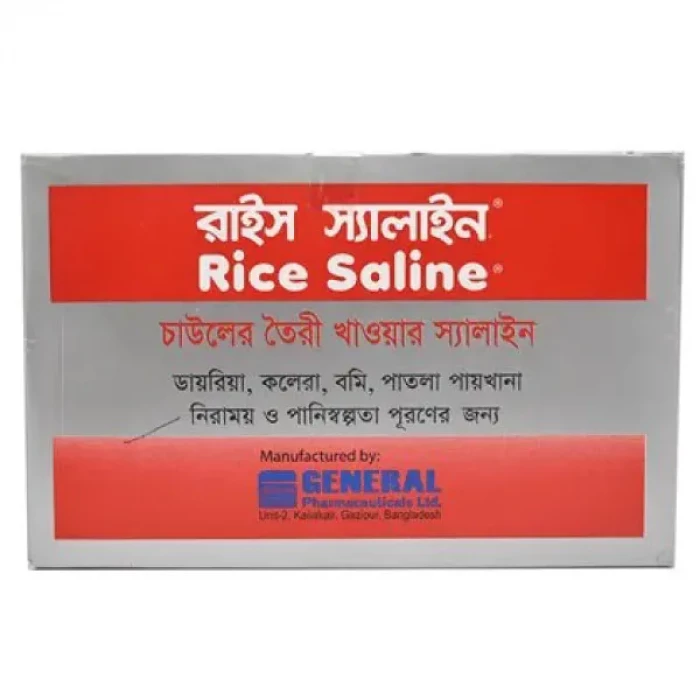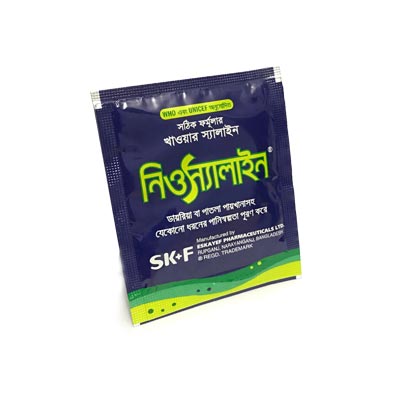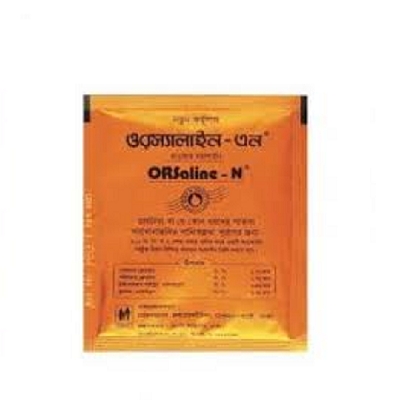
✔ 100% Authentic Product
👁️ Currently Viewing 5392
Rice Saline 500ml
Rice Saline contains Potassium Chloride + Rice powder + Sodium Chloride + Trisodium Citrate (Rice ORS); Used in the treatment of diarrhea.
Discount
Price: ৳ 19
MRP:
৳
20
5%
Off

100% Genuine Products, Guaranteed

Safe & Secure Payments, Always

Fast, Secure & Efficient Delivery

Proper Packaging
 Cash on Delivery - All over Bangladesh
Cash on Delivery - All over Bangladesh Regular Delivery - 12-24 Hours, Dhaka City* Charge Tk.39-59
Regular Delivery - 12-24 Hours, Dhaka City* Charge Tk.39-59 Regular Delivery - 24-48 Hours, Other Cities* Charge Tk.99-110
Regular Delivery - 24-48 Hours, Other Cities* Charge Tk.99-110
 ফ্রি ডেলিভারিঃ - ৯৯৯ টাকা+ অর্ডারে, ঢাকা
শহরে
ফ্রি ডেলিভারিঃ - ৯৯৯ টাকা+ অর্ডারে, ঢাকা
শহরে ফ্রি ডেলিভারিঃ - ২৯৯৯ টাকা+ অর্ডারে, ঢাকার
বাহিরে
ফ্রি ডেলিভারিঃ - ২৯৯৯ টাকা+ অর্ডারে, ঢাকার
বাহিরে
100% Genuine Products, Guaranteed
Safe & Secure Payments, Always
Fast, Secure & Efficient Delivery
Proper Packaging
 Cash on Delivery - All over Bangladesh
Cash on Delivery - All over Bangladesh Regular Delivery - 12-24 Hours, Dhaka City* Charge Tk.39-59
Regular Delivery - 12-24 Hours, Dhaka City* Charge Tk.39-59 Regular Delivery - 24-48 Hours, Other Cities* Charge Tk.99-110
Regular Delivery - 24-48 Hours, Other Cities* Charge Tk.99-110 ফ্রি ডেলিভারিঃ - ৯৯৯ টাকা+ অর্ডারে, ঢাকা
শহরে
ফ্রি ডেলিভারিঃ - ৯৯৯ টাকা+ অর্ডারে, ঢাকা
শহরে ফ্রি ডেলিভারিঃ - ২৯৯৯ টাকা+ অর্ডারে, ঢাকার
বাহিরে
ফ্রি ডেলিভারিঃ - ২৯৯৯ টাকা+ অর্ডারে, ঢাকার
বাহিরে
✅ Description:
Conditions that cause intense loss of liquid and electrolytes, like cholera and severe loose stools and vomiting Parchedness, extremely high salt concentrations in the blood (extreme electrolyte exhaustion)
✔️ Uses of Rice Saline
- Dehydration
- Acute diarrhea
- Cholera
- Vomiting
- Acute fluid and electrolyte loss
✔️ How does Rice Saline work?
Potassium chloride is a crucial positive ion found within cells. It plays an essential role in facilitating the transmission of nerve signals in the heart, brain, and skeletal muscles. Additionally, it contributes to the contraction of cardiac, skeletal, and smooth muscles. Moreover, potassium chloride is involved in maintaining normal kidney function, regulating acid-base balance, supporting carbohydrate metabolism, and promoting gastric secretion.
On the other hand, sodium chloride is the primary positive ion found outside cells. It plays a vital role in maintaining electrolyte and fluid balance, controlling osmotic pressure, and ensuring proper distribution of water throughout the body. Sodium chloride is used to restore sodium ions and serves as a source of electrolytes and water for hydration. It is employed in the treatment of metabolic acidosis, used as a priming solution in hemodialysis, and can be beneficial in managing hyperosmolar diabetes. Furthermore, it serves as a diluent for infusing compatible drug additives.
Trisodium citrate is utilized to activate bicarbonate.
✔️ Side Effects of Rice Saline
Several studies have indicated a slight increase in the risk of hyponatremia (low plasma sodium concentration) in patients who have received this oral rehydration solution (ORS). However, it is important to note that this decrease in sodium levels was minimal and did not result in any noticeable clinical signs or symptoms.
Hyponatremia is a condition characterized by an imbalance of sodium levels in the blood, and it can be associated with various factors including excessive fluid intake or certain medical conditions. In the context of ORS, the risk of hyponatremia is generally low, especially when the solution is used as directed and in appropriate quantities.
It is worth emphasizing that while there may be a slightly increased risk of hyponatremia, the clinical significance of this finding appears to be negligible. The benefits of ORS in treating dehydration and restoring electrolyte balance far outweigh the minimal risk of hyponatremia. However, as with any medical intervention, it is advisable to follow proper guidelines and consult with healthcare professionals for personalized advice and monitoring, particularly in patients who may be more susceptible to electrolyte imbalances or have specific medical conditions.
✔️ Composition
For 500 ml water: Each sachet contains:
- Sodium Chloride BP 1.3 gm
- Potassium Chloride BP 0.75 gm
- Trisodium Citrate Dihydrate BP 1.45 gm
- Processed Rice Powder Pharma Grade 25 gm
For 250 ml water: Each sachet contains:
- Sodium Chloride BP 0.65 gm
- Potassium Chloride BP 0.375 gm
- Trisodium Citrate Dihydrate BP 0.725 gm
- Processed Rice Powder Pharma Grade 12.5 gm
✔️ Quick Suggestions:
- It helps in increasing energy.
- It can help in maintaining electrolyte balance lost due to dehydration
- It also helps in boosting digestion
- It may help in maintaining optimum blood pressure
✔️ Indication
This saline is indicated in-
- Acute fluid and electrolyte loss conditions such as cholera,
- Acute diarrhea & vomiting Dehydration
- Severely low concentrations of salts in the blood (severe electrolyte depletion)
✔️ Pharmacology
In situations like cholera, severe loose stools, spitting, and excessive sweating, this is essential for drying out quite because it contains basic electrolytes and carbohydrates (within the framework of prepared rice).
Up to 20 liters of water are excreted from the typical healthy digestive tract every 24 hours, and almost as much is reabsorbed. This constant exchange of water through the intestinal divider enables the assimilation of soluble metabolites from processed food into the circulatory system.
In the case of diarrheal illness, the balance is upset, and much more water is released than is reabsorbed, resulting in a net loss to the body that may amount to a few liters per day. In addition to the water, there are also misplaced chloride (CI-), extracellular sodium (Na+), and intracellular potassium (K+) particles. This can effectively restore the electrolytes that have been lost in the body.
✔️ Dosage of Rice Saline
The dosage depends on the seriousness of the drying-out conditions of the patients. Age Prescribed Measurements after each watery stool:
- 50 to 100 ml for 6 months to 2 years (10 to 20 Teaspoonfuls)
- 100 ml to 200 ml, between two years and nine years (20 to 40 teaspoonfuls)
- 250 ml to 500 ml for people over 10 years old (1 to 2 glassfuls)
✔️ Reconstitution Procedure:
Preparation for 250 ml saline:
- Wash both hands with soap before preparing the saline.
- Add 250 ml (one glassful) of hot boiled water into a jar.
- Then add a full sachet of this saline (for 250 ml water) powder into the jar.
- Mix the powder well in the water until a milky white solution appears. Give the solution to the patient to drink as per the dose.
Preparation for 500 ml saline:
- Wash both hands with soap before preparing the saline.
- Add 500 ml hot boiled water (two glassfuls) into a jar.
- Then add a full sachet of this saline (for 500 ml water) powder into the jar.
- Mix the powder well in the water until a milky white solution appears.
- Give the solution to the patient to drink as per the dose.
✔️ Advice:
- After five hours, discard any leftover reconstituted salt that hasn't been used.
- Warming or bubbling is not necessary after planning the saline assistance.
- Use of a feeding bottle should be avoided Each time, after recent administration, stir the mixture with a clean spoon.
- The tiny amount of saline can be administered to the baby's mouth using a syringe without a needle.
✔️ Interaction
No Interaction is found
✔️ Contraindications
Diminished urine production due to kidney failure (oliguria) Kidney failure causing a complete lack of urine production (anuria) Blockage in the stomach or intestines Decreased blood flow to vital organs (shock) Persistent and severe vomiting (intractable vomiting) Severe dehydration Severe diarrhea in infants Kidney failure resulting in reduced urine production (oliguria) Kidney failure leading to the complete absence of urine production (anuria) Blockage in the stomach or intestines Decreased blood flow to critical internal organs (shock) Severe and uncontrollable vomiting (intractable vomiting) Severe dehydration Severe diarrhea in infants
✔️ Pregnancy & Lactation
Prescribed in pregnancy & lactation, as there are no known hurtful impacts when this medication is utilized.
✔️ Precautions & Warnings
- Children less than 1 year of age: Children in this age group are more vulnerable to the effects of medication overdose due to their smaller body size and immature organ systems. It is crucial to seek immediate medical attention if an overdose occurs in a child under 1 year of age.
- Patients with an imbalance of salt concentrations in the blood (electrolyte imbalance): An overdose of certain medications can further disrupt the balance of electrolytes in the body, which can have serious consequences. Close monitoring of electrolyte levels and prompt medical intervention may be necessary in such cases.
- Patients with severely decreased kidney and liver function: The kidneys and liver are responsible for metabolizing and eliminating medications from the body. Impaired kidney or liver function can hinder the body's ability to process and eliminate drugs properly, leading to an increased risk of toxicity. Extra caution is required when managing medication overdose in patients with severely decreased kidney and liver function, and immediate medical attention should be sought.
- It is important to note that these precautions are general guidelines, and specific actions may vary depending on the medication involved and the severity of the overdose. If an overdose is suspected, it is always best to contact a healthcare professional or poison control center for appropriate advice and assistance.
✔️ Storage Conditions
Store in a cool & dry put, secured from light & dampness.
⚠️Disclaimer:
At ePharma, we’re committed to providing accurate and accessible health information. However, all content is intended for informational purposes only and should not replace medical advice from a qualified physician. Please consult your healthcare provider for personalized guidance. We aim to support, not substitute, the doctor-patient relationship.









